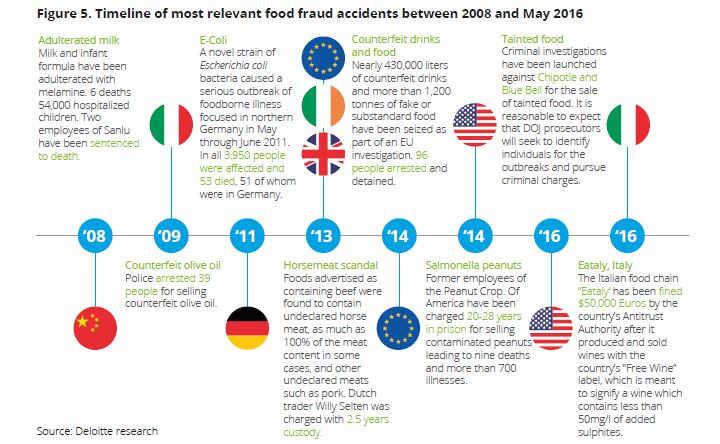The firm said businesses should focus on areas such as regulatory preparedness and compliance, emerging risk visibility and monitoring, crisis management and supplier risk, verification and validation.
Look to pharmaceutical and life science
Deloitte said it believed the pharmaceutical and life science industry serves as an indicator of what is to come in the food industry.
“Across the US and Europe many new bills or directives regarding drug safety mechanisms (pharmacovigilance) and supply chains have been introduced (e.g. prevention of entry into the legal supply chain of falsified medicinal products, track & trace or product safety).

“Regulators are expected to focus more on the food industry to implement similar requirements.
“The food industry should adopt leading practice from other highly regulated industries like pharmaceuticals as a confidence building first step toward greater transparency ahead of being forced by regulators.”
When food safety is compromised, the effects are far-reaching – impacting consumers’ health; influencing consumer opinion as well as that of government and regulators and damaging brands’ reputations and bottom lines.
Food companies and supply chains are constantly being challenged by global trends and market forces outside of their control.
Increasingly they must deal with consequences of climate change, rapidly-increasing populations and the rise of the middle class in the developing world, an ageing population in established countries, the trend towards urbanization and technological progress.
Food firms find themselves dependant on large networks of third party companies, including complex chains of suppliers and distributors as well as licensees, franchise partners, sales promoters or agents, customs brokers and other key advisors.
Companies frequently adopt a three-tiered approach: tier 1 for low risk parties, tier 2 for medium risk and tier 3 for high risk.
Traceability and third party role
In the pharmaceutical industry, traceability requirements were driven by legislation and Deloitte said similar regulatory requirements will be a challenge for the food industry in the medium to long term to ensure supply chain transparency.
Tom McGinnis, USA, Food Safety and Supply Chain lead partner
The US Food Safety Modernization Act (FSMA) contains the most sweeping changes to regulations in decades.
“Companies along the farm-to-fork continuum must now use risk-based preventive controls, verify that foreign suppliers adhere to food safety standards equivalent to US, implement produce safety standards, and safeguard against intentional contamination, among other provisions.
“Supplier management and traceability are key, and FSMA provides the US Food and Drug Administration (FDA) with power to halt production, initiate mandatory recalls, and commence investigations.
“As a result of these changes, organizations need to ensure they are taking an enterprise and operational risk view to their Safe Food Program and embrace contemporary approaches to risk management.”
“Our recommended approach is to invest in serialisation and track and trace technology flexible enough to be tailored to each set of current requirements and also cater for measures scheduled to be introduced over the next decade.”
The food industry will be required to improve capabilities in track & trace, serialization, product authentication and anti-counterfeiting.
Deloitte collaborates with the Consumer Goods Forum (CGF) which founded the Global Food Safety Initiative in 2000.
GFSI has endorsed nine standard schemes to cover most sectors of the food system.
Food companies are using industry standards and third party certification, to ensure food safety and successfully operate in certain markets.
Governmental bodies have started to recognize that private certifications can play a role for industry to achieve food safety goals, said Deloitte, citing the Canadian Food Inspection Agency (CFIA) as an example.
“They are currently in a modernization process with the Safe Food for Canadians Act (SFCA): instead of re-creating new standards, they are leveraging private Food Safety certification (by an accredited third-party) as an input to regulatory risk assessment and inspection resource allocation processes.
“We can foresee that third party certification will suffice for companies to meet, if not to exceed, compliance with regulations.”
